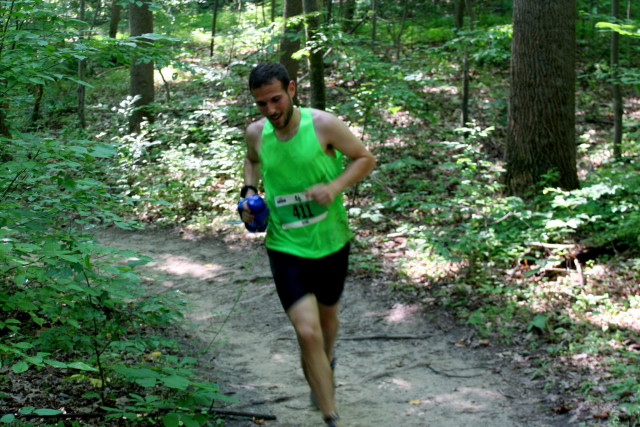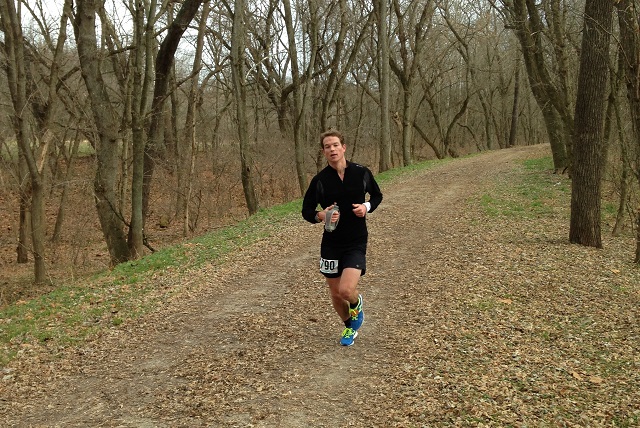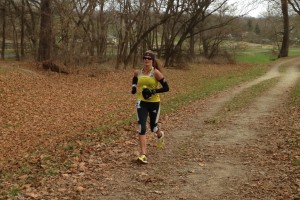
Despite the reliable mercury-busting temperatures, Don Bowman insists that the Rosaryville Trail races are aimed at beginner ultra runners. This year’s running of the 10k, 10 mile, 25k and 50k runs around Rosaryville State Park took place on the hottest day of the year, with dew points bottoming out in the low 70s and temperatures reaching the mid 90s five hours into the race.
[button-red url=”http://www.bluepointtiming.com/files/results/2015/Rosaryville%20overall.htm” target=”_self” position=”left”] Results [/button-red]”We designed it for the novice runners,” Bowman, the race director, said. “They get to run next to the runners who are experienced and they can say they ran with these great trail runners, they don’t have three legs or anything special. They learn that they could be like the people in the front if the race agrees with them and they want to improve.”
Indeed, both of the winners were relative neophytes, each on their third 50k or longer race.
Chris Patrick, who won the women’s 50k title in 4:56:40 ( a 9:32 average), set her sights low but finished high — third overall.
“It’s cheesy, but I just wanted to have fun,” she said. “If I won, that would be nice, but I just wanted to enjoy myself. It was a very specific kind of fun.”
Patrick, a 21-year-old Serverna Park resident, started “painfully slow” and then moved up in the second of three nearly-10-mile laps, though her third was “a lot of whimpers.”
“”Trail racing is great because even when everything is feeling terrible, you can still look around and everything is wonderful.”
She isn’t a frequent racer, has never run a marathon and rarely, if ever, competes on the roads. She signed up for Rosaryville two weeks ago while looking for a challenge. That contrasts with men’s winner Jarrod Brennet, of D.C., who focused on this race and conducted a deliberate taper.
“There was no way I was going to back out,” he said, when weather forecasts warned of high temperatures and humidity. “I wanted to prove I could do a fast 50k.”
He too struggled over the third loop, but a winter 50 miler in the Everglades still felt hotter than Rosaryville, so running 7:50s en route to a 4:03:38 finish wasn’t as impossible, but it still required some adjustment. At 25, he’s still new to ultarunning.
“I was going to run by heart rate, but early on I was 20 beats per minute faster than my target so I had to forget about that and just go by feel,” he said.
The forested loops of the park in Upper Marlboro, Md. were almost entirely single-track, with clearings dotting the loop and bathing runners in sun. The last mile stretch to the finish was completely exposed to the sun, giving runners one last challenge. Sixty-eight people finished the 50k, skewing slightly female, and 82 finished the 25k, just slightly favoring the men. The looped course made it easier for runners to downgrade their distance, an option Rosemary Lather, of Columbia, took.
“I got to the second aid station, which was about halfway through the course, and I felt like I had run more than half of the race,” she said. “I decided to head back early, and because of that, I feel like a million bucks.”
Like Patrick, she was a relative last-minute registrant. Her children pleaded with her not to do the 50k, her husband was more understanding. She responded by taking off her wedding ring during the race, but it wasn’t to pick up sweaty runners.
“My hand was swelling and my ring finger turned purple,” she said. “It took a lot of Vaseline to get it off. I’d recommend people not wear jewelry for hot races like this.”
She’s new to the trails, and hopes to reap the benefits when she races either the Erie, Richmond or Houston marathons.
“I knew to not even think about trying to run a certain pace,” she said.
Meredith Gray of Bowie, a recent transplant from Ohio, adjusted her goals for the 25k, part of her training for the Monumental Marathon in Indianapolis this Fall.
“I knew conditions were going to be tough,” she said. “I walked when I needed to. I haven’t felt summer weather like this, but I kept telling myself that it will pay off when the weather cools down.”
Aaron Gow, of Dumfries, also sees his trail running experience making a difference in his road racing. He’s run more than two dozen half marathons. The Rosaryville 25k was his first-ever trail race, done with his girlfriend’s encouragement.
“It was a challenge course for someone used to running on the roads,” he said. “I’m assuming if I do this more often, my road running will improve.”
His girlfriend, who ran the 50k, tried to set him up for success with a series of training runs on trails ahead of time.
“I was told slow the pace down, eat at all the rest stops, take in a whole lot of water and just walk the hills,” he said. “Basically, check my ego at the door. On a day like today, it wasn’t too hard to do that. We never got a break from the humidity and the heat just kind of built up the entire time.”
The 50k boasted 68 finishers, and 82 ran the 25k.

Even after 50 miles of running, Zach Miller was still happy to be out on the JFK 50 Mile course.
For a guy who spends five months at a time at sea, the latest champion of the east coast’s big fall ultramarathon doesn’t take any time on land for granted. Miller, not to be confused with 2003 runner up Zachariah Miller, is based in Columbia, Pa., but that’s just a place his junk mail shows up while he’s on the boat. Results
“It’s good and it’s bad,” Miller said about his job operating printing equipment on cruise ships. “I’ve gotten to run on five continents and I’ll be able to do South America soon, but I really can’t get fast running 10 miles a day on a treadmill.”
That didn’t stop him from pulling away from Ultra Race of Champions winner Rob Krar somewhere between mile 33 and 38 and cruising to victory in 5:38:53, the third fastest time on the course and the youngest, at 25, under 5:40. Krar did not finish the race. Matthew Flaherty of Bloomington, Ind. was second in 5:44:37 and Arlington’s Michael Wardian, he of two marathons in a single day earlier in the week, finished third in 5:55:37.
“When they said I was going to come in under 5:40, I couldn’t believe it,” Miller said. “Only two guys had done that before, and one was Max King (2012 winner and course record holder at 5:34:59).”
Miller’s job affords him months-long vacations, and this one included a road trip to Nevada for the USATF 50k trail championships. A sixth-place finish helped convince JFK race director Mike Spinnler to let Miller into the race, though he didn’t decide on it until a few days before.
“I got the okay but I really had to think about if I really wanted to do it,” he said. “A 50 mile is a lot different from a 50k. I had never run more than 35 miles before.”
Whatever pre-race worries seemed quaint in retrospect of a race that came together “perfectly.” He took the 13 miles of alternating road and technical Appalachian Trail easy, cautiously navigating the rocks.
“I wanted to make sure my ankles came out of it,” he said. “I was falling back, but there was plenty of race left.”
When he and Jason Wolfe hit the C&O Canal Towpath for 26.3 miles, they took down the pace, but Miller considered that he might be running on borrowed time, though it was Wolfe who didn’t finish.
“I thought if we kept sub-6:00 pace up too long, I might blow up by mile 25,” he said. “I was working pretty hard, but once I caught up with Rob (Krar) and found out who he was, I was just happy to be up there with him. I was floored just to be in a position to be second to him.”
Miller didn’t know the kind of lead he had, or that Krar had dropped out, until he hit a tight turn with a little more than eight miles to go. On the rolling hills headed into Williamsport, Md. he tried to reconcile some of the splits he got from escort vehicles, 6:15 for one mile, with the fact that he had never pushed his body that far in a race.
“I was in the great unknown,” he said. “I was just seeing what I could do at that point, it felt like it was all adrenaline. I nailed the nutrition, because you have to take a lot of food to keep going. I think I had a banana at every aid station and my homemade gu.”
Oddly enough, the former Rochester Institute of Technology 10k runner might be well suited for ultra running because of his job situation.
“I don’t have the opportunity to train for a fast marathon, but I can get really strong,” he said. “When were at port, I go out and run because that’s my chance to get off the treadmill. If we’re in port for four hours, I’ll go run for four hours. Norway, South Africa, I just go out and run mountains.”
Warren County, Va. native and Flagstaff resident Emily Harrison might not have matched her time from her ultramarathon debut last year, when she dipped under the old course record coming in second to Ellie Greenwood, but she still managed to race with a commanding lead and capture the title that eluded her before.

“I felt a little off from the start,” she said. “Even leading up to the race, I knew I wouldn’t be as fast but (coach and habitual JFK runner) Ian Torrance said I could run in the 6:30s, so I just focused on getting the win.”
Her 6:35:05 was nothing to scoff at, because it was well ahead of Frederick’s Sage Norton‘s 7:14:03 and Boulder’s Kara Henry‘s 7:17:37.
“I just didn’t drop my pace on the canal this year,” she said. “I did get to see my parents and grandparents driving along the canal and thought to myself that I’d get to see them in a few miles.”
Those were just two of the 863 runners to finish the trek between Boonesboro and Williamsport, run the day after the 50th anniversary of President Kennedy’s assassination.
Erik Price hasn’t had his pick of great days in either of the ultras he’s run this year. The Oakton resident tried his hand at the Northern Virginia North Face Endurance Challenge 50 Mile in June, which saw hot muggy weather demolish the field. At JFK, temperatures in the upper 30s and lower 40s, which took a hit at mid-day were accompanied by a constant headwind. That’s coupled with the long, consistent stretch on the towpath, made Price somewhat wistful for the sweltering North Face conditions.
“Running that far on a flat course, you use the same muscles, make the same motion for so long,” he said. “People told me JFK was a tough race but I didn’t see it, looking at the elevation chart. Now I know.”
The conditions hit Reston’s Andrew Simpson hard, but he managed what he called a “great race” despite all of it.
” I think I was close to hypothermic,” he said after recovering from his 39th place finish in 7:29:32.
“Somehow I sprained my ankle along the way but didn’t notice until I stopped and tried to walk around the gym at the middle school,” he said. “Definitely an epic day for ultra-marathoning. I would think that JFK would have been very proud as the course tests you both mentally and physically.”
Simpson’s Team FeXY finished second in the men’s open category to Pain Train.
Lara Shegoski finished fourth on the women’s side, hundreds of miles away from where her Johns Hopkins University cross country teammates were celebrating their second consecutive Division III women’s cross country national championship. Shegoski spent a week out of training with the flu and getting back into the swing of training wasn’t easy.
“My coach said I could try to get back into shape and run one more race, but I figured it was time to move on,” she said. “I spent the summer not running because of ROTC training, so I wasn’t in shape for college racing.”
The ultra distance, though, worked out quite well. In a race that would make Aristotle proud, she just ran without a strategy or preconceived notion about the race, her mind a blank slate. That led to a surprise midway through the race.
“I thought I’d run nine hours,” she said. “I was running with two other women and one of them mentioned we were on sub-7:30 pace. Once I heard that, I started getting a little worried, so I stopped looking at splits.”
She finished in 7:20:45.
Eugene resident Emily Halnon signed up for the race while living in Washington, D.C., but she found her new training environment rocketed her into an optimistic mindset for the race.
“You have great trails, and great runners of all kinds,” she said. “It’s not just “Track Town.'”
She took the Appalachian Trail section carefully and managed to emerge unscathed.
“I fall in road races, so that was really big,” she said. “But it meant a lot of people passed by me.”
She emerged onto the towpath in 26th place and worked her way up to seventh by the time she turned onto the road, holding that place to the end.
Triathlete Alyssa Godesky of Baltimore had a breakthrough race, running 7:38:20 on her fifth JFK race for sixth place. Her previous best was around 8:05. She was the second woman to reach the towpath but found her pursuers running faster than she thought was sustainable for that long a race.
“I tried to hold on but I saw my Garmin putting us in the low-eights (pacewise) and I knew that wasn’t my plan, so I let them go,” she said. “I know what I’m getting myself into, I guess. I was excited to race an ultra now that I know how to race, triathlon definitely taught me that. I used to do ultras trying to go fast, but I have a different mentality now.”

